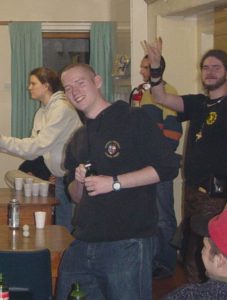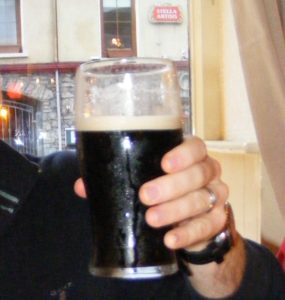How to Beat Self Destructive Drinking
I left University with more than a degree. I also left with a drink problem.
It started with occasional nights out and quickly escalated into week long binges where I was drunk or hungover more than I was sober.
A few times I made myself really ill. Other times I blacked out and had no recollection of how I got home or I would wake up with cuts on my hands.
I went out for drinks for my 20th birthday – I remember nothing after about 8.30pm apart from a 10 second flashback stumbling around in the snow trying to find my way home.
When I look back now, I think about how some nights could have ended very differently.
This drinking was always tempered by the fact that I didn’t have much money. That all changed when I got a desk job. The shackles of financial destitution were gone. Every time I went out, I hit it hard.
Really hard.
On one occasion I turned up for a public event still plastered from the night before. My boss noticed but, considerately, said nothing.
The last big blowout was at birthday party in a friend of a friend’s flat. I barely knew the girl or her friends so I got blind drunk in the kitchen. One of my crew sacrificed the rest of his night by driving me home.
I look back on this time, not with regret, but with thankfulness of what it taught me. I probably learned more than just the three lessons you see below, but they encapsulate those three years of my life well. Keep reading to find out more.
(This was taken during some of my heaviest drinking days)
Going Sober Was my Only Option
I used to think that having a drinking problem meant living in squalour while drinking high strength cider from a blue plastic bottle. Or doing an ‘Alice Cooper’ (Cooper reportedly drank a bottle of whiskey for breakfast at the height of his alcoholism).
But now I’m convinced of this: You don’t need to be an alcoholic to have a dysfunctional relationship with alcohol. I wasn’t an addict. But I did drink for the wrong reasons.
I drank to lose control and sometimes to hurt myself. I didn’t enjoy drinking per se but I did like the buzz of being less accountable for my actions and more unpredictable. I liked to be the guy who could drink the most and still stay upright.
The flipside is that I hated the person I became when I was drunk. It was as if all of my negative character traits were amplified to intolerable levels.
Just as well my drinking buddies were drunk too or they would have been sick of me after a while.
Looking back, I can see how I’d got into a negative habit loop of a combination of FOMO (Fear of Missing Out), self-destructiveness, and release through a lack of self respect.
Eventually an older friend sat me down and told me that I was out of control. I decided there and then to go sober. I went home and emptied the wine and vodka I kept in the house down the sink.
At the time I felt nothing – no catharsis, no regret. Just numb.
When I told people I’d given up drinking they laughed. I was the life and soul of the party – I had to be joking right?
Wrong.
It was even more severe than ‘I’m not drinking’.
I withdrew from situations where alcohol was being consumed. I didn’t go to bars or clubs.
On my wedding day, I drank coffee and diet coke. It was the only way I could guarantee that I wouldn’t slip up.
I had been engaged in a gradual but definite spiral to a place that, ultimately, I didn’t want to go. When I sat on that sofa talking to my friend, I had no option but to give it up.
It had to be all or nothing. At least until I could control my drinking – where it was positive and not destructive.
It’s Harder to Gain Weight When you Don’t Drink
One of the unfortunate side effects of drinking so much was weight gain. I would drink to excess and then pig out on takeaway foods, pizza and bar snacks.
The following day I would be so hungover that I’d sleep until noon then hit an all day breakfast with a can of Irn-Bru (a Scottish soft drink that tastes of heaven and sex).
My weight used to fluctuate like mad. At University I was active, playing sports and walking everywhere. But when I started working I was sat down for most of the day and had a car. My weight ballooned.
Exercise was out of the question, I could barely run to the end of the street.
But when I stopped drinking, I found that I didn’t gain weight as easily. I didn’t have hangovers anymore either (duh) so Saturday mornings could be spent walking to the shops or going for a run.
When I trained in martial arts, I’d be fresh all the time while guys I trained with would be slower even if it had been a couple of days since they’d last had a drink.
Sometimes You Have to Give Something Up to Make Progress
At the time I gave up drinking, it felt like a HUGE deal. It was going to have a potentially massive impact on my lifestyle (in the end it didn’t for a variety of reasons).
How would I cope? At first it felt like I was giving something up – something of value to me.
But in reality, I wasn’t really losing, I was gaining. I achieved so much in those three years that I don’t regret giving up the booze. Not for one moment.
But the main upshot was that I broke the self-destructive habit loop of drinking to excess on a regular basis and doing it for damaging reasons.
That’s translated into other areas of my life – where things don’t work out the way I think they will but something better comes as a result.
Almost exactly a year ago I was at my lowest I’d been for a while. It was at this time that I bought Gorilla Mindset which, as many of you will know, was a game changer for me and in part, inspired me to start this website.
In the book, Mike Cernovich talks about the power of framing – putting a positive light on things. Which works on so many levels. You truly can positively frame almost any negative thought or emotion.
Recently I was cycling home in the rain. It was pretty nasty as buses splashed passed me. I was soaked in no time. But at the same time, I was thinking to myself: ‘Imagine how much more resilient you are going to be having experienced this.’
That’s the power of positive framing – to see a good outcome where others would see bad.
Giving up drinking was a true turning point in my life – like buying Gorilla Mindset, starting this website, having kids etc etc. Sometimes giving something up allows you to gain so much more.
“He is no fool who loses what he cannot keep to gain what he cannot lose.”
What About Now?
Now it’s nine years since I stopped drinking. If you do the maths, that means I’ve gone back to drinking alcohol and have done for 6 years.
I stopped drinking because it was something I couldn’t control. But having that break from it changed everything to the point where I can control how I drink. I don’t do it to mess myself up or to lose control. I do it socially, with friends or family and get pleasure from it.
These days I rarely drink – the odd glass of wine here and there or a single malt. I haven’t been close tipsy for 6 months.
So why write this down?
Partly it’s cathartic. But also I know there are young men (and women) who read this website who could well be going through what I’ve been through.
My main regret with that part of my life is that no-one sat me down earlier and told me that I was being an idiot. The first time it happened, I quit on the spot.
So if you’re a younger person and you have a poor relationship with alcohol, maybe it’s time to quit. Pro boxer Ed Latimore recently wrote about how he’s given up drinking which also gives some great insight (and gave me the confidence to share my story).
Suffering the ridicule and shame of your social grouping is a small price to pay and will make you stronger in the long run. You will make big progress and gains in your life. I guarantee it.
P.S. Did you think this post was a bit long? My emails are a lot shorter. You can read them by signing up to my mailing list.




Great post Neil. Destructive drinking (caused by underlying issues I was yet to deal with) led me to waste a lot of time and money from when I was 19-22. Whilst I didn’t give up per say I came to a point where I knew I needed to make some changes. The big issue was that I was in an environment where drinking a lot was not only normal but encouraged.
At 26 my lifestyle has completely changed (from the email I sent you that was probably obvious), I changed direction in terms of my career, work, location and mindset and had to make a few big changes including letting go of a circle of people from back in the day.
The funny thing is now I don’t really have time to even drink much anymore, my schedule is filling up and my goals are the total opposite of anything to do with the party lifestyle, like a drink on occasion but I don’t miss it at all and my life is so much better as a result.
Thanks for your comment and I’m glad my experiences were reflected in your own. It sounds to me like you’ve made some smart choices since your early 20s. I’m the same as you – I’ll occasionally drink but haven’t been close to tipsy for almost a year. Now on the weekends, I leap out of bed and go running or play with my kids until either one of us (or both) fall down exhausted. It’s a much better way to live your life.
Keep pushing on and improving.